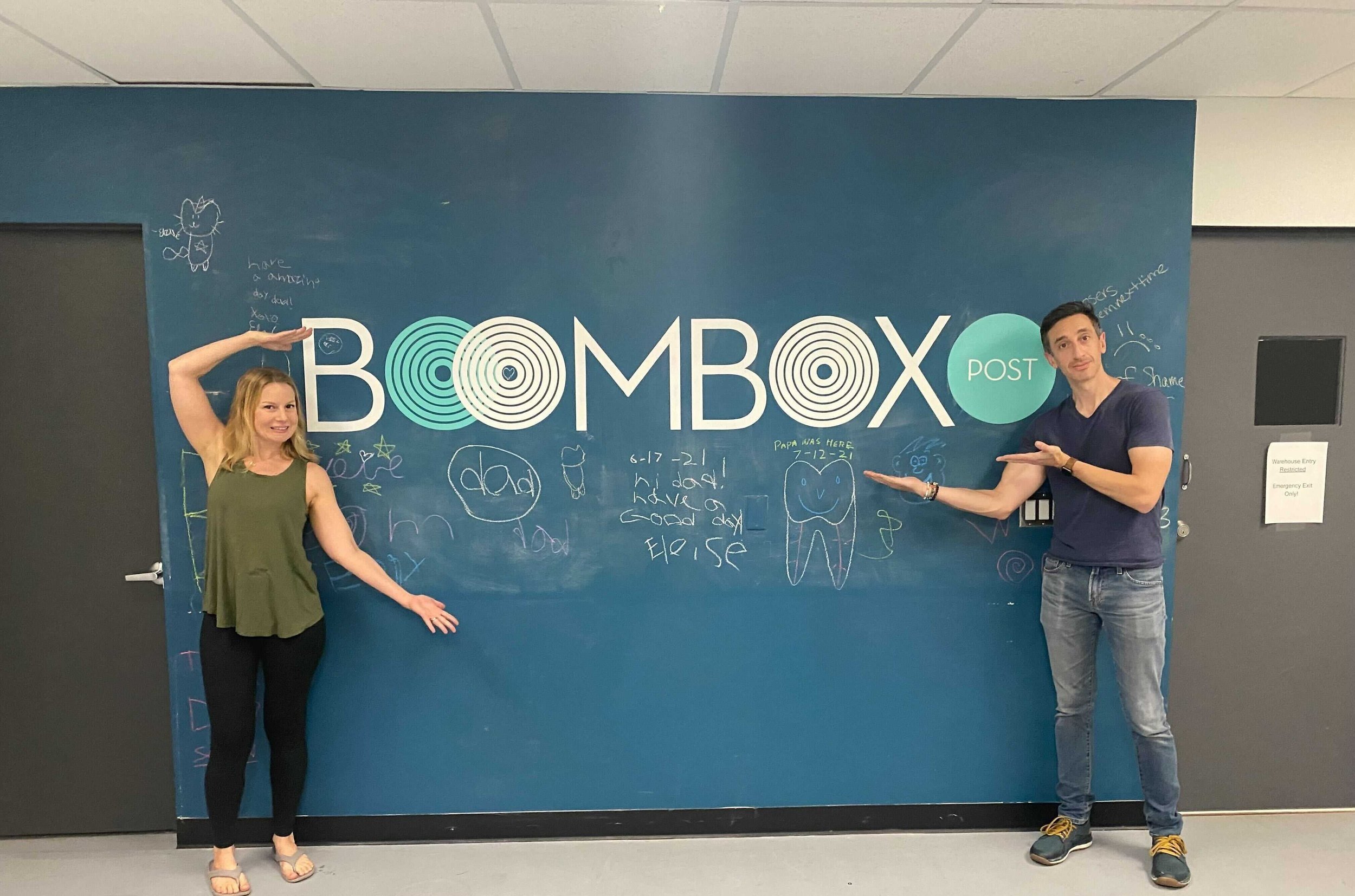Over at our other company, Boom Box Library, we recently released “Magic Chimes,” a library of mark tree and bell tree recordings for sound design and music applications. The library has been a big success thus far, clearly filling a need in the sound library community. Creating it from scratch was very fun, so I thought it would be interesting to share the process with you.
Data management in audio post-production can impact productivity and is a vital skill for many reasons. Most of the materials we accept and send out can take up a lot of space on a hard drive, there are assets coming in from multiple sources, and especially with TV shows, there are influxes of files coming in constantly. Without a solid structure for organizing locked pictures, sound effects edit sessions, music exports, mixes, and deliverables, wading through data can turn from a tide pool into a tidal wave. Whether working as a freelancer, editing or mixing in post-production, or at a company like Boom Box Post, here are five data management tips to consider.
We released two new custom libraries this week: Magic Chimes & the Editor Toolbox: Construction Edition. To celebrate, we made our entire Boom Box Library store 25% off. From now through Cyber Monday, you can add our Black Friday/Cyber Monday discount to your order to snag an EXTRA 15% off on top of that. Just add BFCM during checkout.
The Construction SFX Library contains essential sound effect recordings of manual and power tools as well as construction site ambiences. Included are the sound effects for items such as a circular saw, cordless drill, chainsaw, shop light, nail gun, hammer, hand saw, toolbox foley, large and small construction site ambiences, and more.
This highly curated and easy-to-use library is perfect for a video editor or sound effects editor working on a project involving tools or construction.
We are extremely proud to announce the release of our latest Boom Box Library: The Magic Chimes SFX Library!
The Magic Chimes SFX Library contains a wide variety of professional mark tree (the professional name for wind chimes) and bell tree sound effect recordings. These include glissandos, scales, single notes, steadies, shaking, and more.
Creature vocals or monster vocals, if you will, are one of the more conceptually challenging elements to telling a story through sound. I always struggle with, “Is it real enough?” or “Is this vocal believable for this creature on screen?” Of course, that’s a matter of personal opinion and experience, but there are some approaches that make the design process of these vocals a little more palpable and easier to arrive at the “finished” product.
October was a very busy month for us here at Boom Box Post, as we finished packing up our 211 W Palm Ave office. The final goodbye was on November 1st; and while 211 W Palm Ave has been a homebase for our Boom Box Post team these past 7 years, we are beyond excited to move into our new location and create more memories together.
If you missed Jeff’s big announcement in his blog post Introducing Boom Box Post Verdugo, we are currently building a new facility that will be all our own! We are in the home stretch of construction of our new studio which will feature three Atmos-ready mix stages. We are hoping to complete construction in about a month, and then we will move on to fabric, wiring, and gear installation on the stages. Because this process has been fascinating to us as first-time mix stage builders, I thought I would share our progress thus far with all of you.
Today I’m going to be discussing a virtual instrument called Gravity by the folks at Heavyocity. It’s loaded into and powered by Kontakt Engine by Native Instruments. While Gravity itself doesn’t have a free version available, Kontakt is available as both a free version and full version. Gravity is an incredible, extensively customizable virtual instrument designed predominantly for use in modern scoring. It’s comprised of 4 instrumentation sections: Hits, Pads, Risers, and Stings. Each of these 4 main sections breaks down further into complex blends of the loaded-in beautiful, high quality samples within the category as well as the simplified individual samples for additional customization with the effects and other adjustable parameters.
From its beginnings in 1920’s live broadcasts to “walking” with MIDI, Foley has always been a valuable form of character development, allowing viewers to learn more about a character through both visual and auditory cues. Whether we realize it or not, we can unconsciously assume more about a character by the sounds they make, as we did to first survive in the wilderness by detecting on-coming sounds as family or strangers. Foley artists can achieve unique footsteps that we learn to recognize in their own performances, but how have digital Foley techniques impacted character design? Boom Box Post’s Foley editor Carol Ma dives into the details of character design through digital Foley.
In this blog series we will be surveying our Boom Box Post team on different audio tools and equipment in hopes to help you decide if the chosen products are worth it or not! Up first, Pro Tools Ultimate!
When I hear telemetry, I’m reminded of the music of twentieth century Austrian composer, Arnold Schoenberg. He used a style called Serialism, which took a mathematical approach to developing melodies and rhythms and focused on atonality. He developed a technique called the tone row, which takes the twelve chromatic notes of a scale, and places them in a random sequence. The sequence is then manipulated by flipping it backwards and turning it upside-down. This develops into a chaotic composition with a melody that is difficult to follow, much like a typical telemetry loop in a sound library.
Space Controller allows for a new way to pan sound sources instead of the traditional method of using knobs, joysticks, or a computer mouse. There is a separate app for mobile devices which allows the device to be used as a movement reader to pan the sounds according to the position of the device.
From Back to the Future to Edge of Tomorrow, the concept and interpretation of “interdimensional time jumping” has been a key feature in sci-fi films and TV-shows. Such out-of-this-world story telling requires the support of creative and exciting sound design to immerse the viewer into the stretching of space. Read on to learn how Jessey builds a unique time jump sequence.
Welcome to the battle of the memes! It is up to you, the readers, to vote a winner for your favorite audio post production related meme created by our Boom Box Post Team!
Before audio post-production was even a possibility, composers would incorporate the emotion and the action of what they saw on the screen into their musical scores. They played the role of sound FX editor and composer, with a technique referred to as “Mickey-Mousing” where the composer would exaggerate a character’s movements with specific orchestration and musical motives. Now that sound FX editors have taken this role in post-production, Mickey-Mousing is less common, so it’s key for sound FX editors to make cuts that work with the music in the overall mix for a film or tv-show. Here are some considerations and tips that our team shared on their approach to editing with music in mind.
Collaborating is a big part of our industry. Even in sound editorial, where we are usually by ourselves in a room when we work, we collaborate in projects with mixers, supervisors, Foley artists, and also share editorial with other sound designers/editors.
We are all familiar with the saying, “You learn something new everyday!” Well, in hopes that we can all continue to learn and grow together, I would like to share with you a few super simple workflow “hacks” that had me questioning, “How did I not know this before!?”
Whether you’re mixing for film in 5.1 surround or Dolby Atmos, it’s important to consider a key element of human auditory perception: localization. Localization is the process by which we identify the source of a sound. We may not realize it, but each time we sit down to watch a movie or TV-show, our brains are keeping track of where the sound elements are coming from or headed towards, like spaceships flying overhead, or an army of horses charging in the distance. It is part of the mixer’s role to blend the auditory environment of a show so that listeners can accurately process the location of sounds without distraction or confusion. Here are some psycho-acoustical cues to consider when mixing spatial audio.
We are so excited to showcase our latest work in the new Netflix animated TV show, Centaurworld! In honor of the shows release, we asked one of our sound editors to dive into some of the magical sound elements she created for the show. Get ready to learn about how Katie designed the “magical artifact” seen in the trailer and first episode of Centaurworld!





















